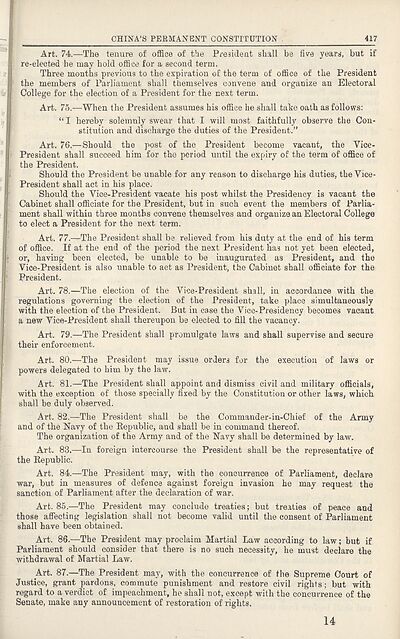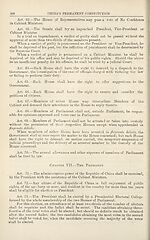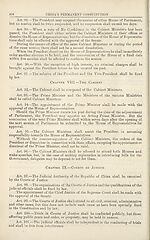1924
(473) Page 417
Download files
Complete book:
Individual page:
Thumbnail gallery: Grid view | List view

CHINA’S PERMANENT CONSTITUTION
417
Art. 74.—The tenure of office of the President shall be five years, but if
re-elected he may hold office for a second term.
Three months previous to the expiration of the term of office of the President
the members of Parliament shall themselves convene and organize an Electoral
College for the election of a President for the next term.
Art. 75.—When the President assumes his office he shall take oath as follows:
“I hereby solemnly swear that I will most faithfully observe the Con¬
stitution and discharge the duties of the President.”
Art. 76.—Should the post of the President become vacant, the Vice-
President shall succeed him for the period until the expiry of the term of office of
the President.
Should the President be unable for any reason to discharge his duties, the Vice-
President shall act in his place.
Should the Vice-President vacate his post whilst the Presidency is vacant the
Cabinet shall officiate for the President, but in such event the members of Parlia¬
ment shall within three months convene themselves and organize an Electoral College
to elect a President for the next term.
Art. 77.—-The President shall be relieved from his duty at the end of his term
of office. If at the end of the period the next President has not yet been elected,
or, having been elected, be unable to be inaugurated as President, and the
Vice-President is also unable to act as President, the Cabinet shall officiate for the
President.
Art. 78.—The election of the Vice-President shall, in accordance with the
regulations governing the election of the President, take place simultaneously
with the election of the President. But in case the Vice-Presidency becomes vacant
a new Vice-President shall thereupon be elected to fill the vacancy.
Art. 79.—The President shall promulgate laws and shall supervise and secure
their enforcement.
Art. 80.—The President may issue orders for the execution of laws or
powers delegated to him by the law.
Art. 81.—The President shall appoint and dismiss civil and military officials,
with the exception of those specially fixed by the Constitution or other laws, which
shall be duly observed.
Art. 82.—The President shall be the Commander-in-Chief of the Army
and of the Navy of the Republic, and shall be in command thereof.
The organization of the Army and of the Navy shall be determined by law.
Art. 83.—In foreign intercourse the President shall be the representative of
the Republic.
Art. 84.—The President may, with the concurrence of Parliament, declare
war, but in measures of defence against foreign invasion he may request the
sanction of Parliament after the declaration of war.
Art. 85.—The President may conclude treaties; but treaties of peace and
those affecting legislation shall not become valid until the consent of Parliament
shall have been obtained.
Art. 86.—The President may proclaim Martial Law according to law; but if
Parliament should consider that there is no such necessity, he must declare the
withdrawal of Martial Law.
Art. 87.—The President may, with the concurrence of the Supreme Court of
Justice, grant pardons, commute punishment and restore civil rights; but with
regard to a verdict of impeachment, he shall not, except with the concurrence of the
Senate, make any announcement of restoration of rights.
14
417
Art. 74.—The tenure of office of the President shall be five years, but if
re-elected he may hold office for a second term.
Three months previous to the expiration of the term of office of the President
the members of Parliament shall themselves convene and organize an Electoral
College for the election of a President for the next term.
Art. 75.—When the President assumes his office he shall take oath as follows:
“I hereby solemnly swear that I will most faithfully observe the Con¬
stitution and discharge the duties of the President.”
Art. 76.—Should the post of the President become vacant, the Vice-
President shall succeed him for the period until the expiry of the term of office of
the President.
Should the President be unable for any reason to discharge his duties, the Vice-
President shall act in his place.
Should the Vice-President vacate his post whilst the Presidency is vacant the
Cabinet shall officiate for the President, but in such event the members of Parlia¬
ment shall within three months convene themselves and organize an Electoral College
to elect a President for the next term.
Art. 77.—-The President shall be relieved from his duty at the end of his term
of office. If at the end of the period the next President has not yet been elected,
or, having been elected, be unable to be inaugurated as President, and the
Vice-President is also unable to act as President, the Cabinet shall officiate for the
President.
Art. 78.—The election of the Vice-President shall, in accordance with the
regulations governing the election of the President, take place simultaneously
with the election of the President. But in case the Vice-Presidency becomes vacant
a new Vice-President shall thereupon be elected to fill the vacancy.
Art. 79.—The President shall promulgate laws and shall supervise and secure
their enforcement.
Art. 80.—The President may issue orders for the execution of laws or
powers delegated to him by the law.
Art. 81.—The President shall appoint and dismiss civil and military officials,
with the exception of those specially fixed by the Constitution or other laws, which
shall be duly observed.
Art. 82.—The President shall be the Commander-in-Chief of the Army
and of the Navy of the Republic, and shall be in command thereof.
The organization of the Army and of the Navy shall be determined by law.
Art. 83.—In foreign intercourse the President shall be the representative of
the Republic.
Art. 84.—The President may, with the concurrence of Parliament, declare
war, but in measures of defence against foreign invasion he may request the
sanction of Parliament after the declaration of war.
Art. 85.—The President may conclude treaties; but treaties of peace and
those affecting legislation shall not become valid until the consent of Parliament
shall have been obtained.
Art. 86.—The President may proclaim Martial Law according to law; but if
Parliament should consider that there is no such necessity, he must declare the
withdrawal of Martial Law.
Art. 87.—The President may, with the concurrence of the Supreme Court of
Justice, grant pardons, commute punishment and restore civil rights; but with
regard to a verdict of impeachment, he shall not, except with the concurrence of the
Senate, make any announcement of restoration of rights.
14
Set display mode to:
![]() Universal Viewer |
Universal Viewer | ![]() Mirador |
Large image | Transcription
Mirador |
Large image | Transcription
Images and transcriptions on this page, including medium image downloads, may be used under the Creative Commons Attribution 4.0 International Licence unless otherwise stated. ![]()
| Asian directories and chronicles > 1924 > (473) Page 417 |
|---|
| Permanent URL | https://digital.nls.uk/196430058 |
|---|
| Attribution and copyright: |
|
|---|---|
| Description | Volumes from the Asian 'Directory and Chronicle' series covering 1917-1941, but missing 1919 and 1923. Compiled annually from a multiplicity of local sources and research. They provide listings of each country's active corporations, foreign residents and government agencies of all nationalities for that year, together with their addresses. Content includes: various treaties; coverage of conflicts; currencies and taxes; consular fees; weights and measures; public holidays; festivals and traditions. A source of information for both Western states and communities of foreigners living in Asia. Published by Hongkong Daily Press. |
|---|---|
| Shelfmark | H3.86.1303 |
| Additional NLS resources: |

